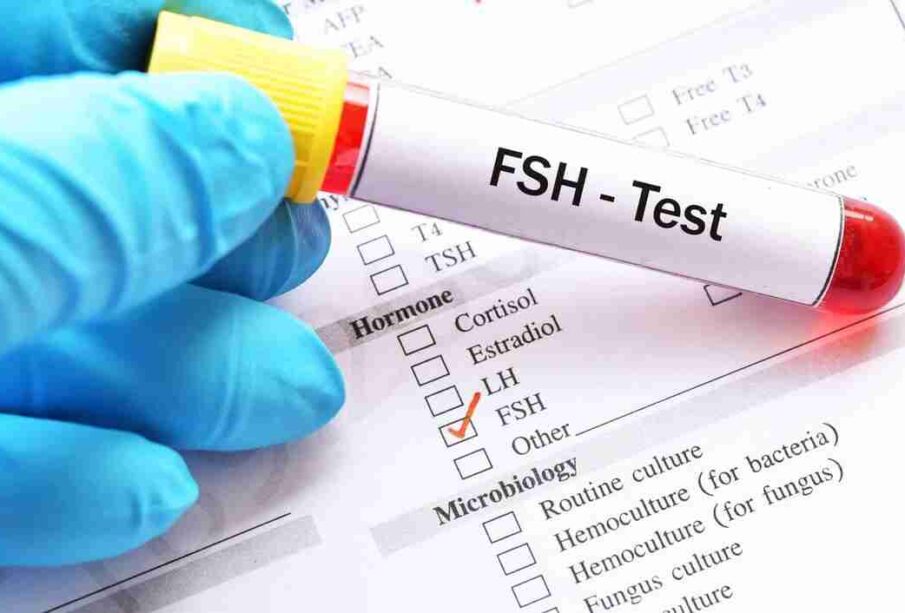Follicle-stimulating hormone (FSH) Blood Test and Understanding the Results

Follicle-stimulating hormones (FSH) are a significant element to the reproductive system of the human body. The hormones oversee the growth of the ovarian follicles that discharge eggs called ova. Without the discharge of FSH, the reproductive cycle cannot function as the ovaries fail to release an egg. The developed follicles also are responsible for generating progesterone and estrogen which helps to maintain the flow and cycle of menstruation. As for males, this developed follicle-stimulating hormone assists in the growth of sperm.
Doctors, measure the level of FSH by FSH test to analyze fertility or to check if a female is going through menopause. A doctor asks for an FSH blood test to examine and identify the underlying reasons which may affect the reproductive system adversely.
Understanding the Follicle-stimulating hormone (FSH) levels test?
The FSH test is primarily utilized to track the level of Follicle hormone that exists in the blood. These hormones essentially comprise of pituitary gland located around the brain.This hormone plays a significant role in reproductive processes.
- In females, FSH helps in managing and controlling menstruation and also acts as a catalyst for the development of eggs. FSH levels keep on changing during the menstrual process, the highest level is reached when the ovary receives an egg. The process is also called ovulation.
- In males, FSH supports the growth and development of sperm production. FSH levels usually don’t change much and tend to remain constant.
- The FSH level is generally low in children. However, the FSH levels increase with time as these children approach puberty. For girls in their adolescence FSH assists the ovaries to create eggs. On the contrary FSH in boys helps to enhance testosterone levels.
Therefore, too little or too much follicle-stimulating hormones can invite different types of issues like infertility, menstrual problems in females, and low libido in men and can also cause early or delay puberty.
Why do you need a follicle-stimulating hormones (FSH) blood test?
A follicle-stimulating hormone (FSH) blood test is done under these conditions. Females might be asked to have this FSH test anytime in their menstrual cycle. So, for females, you may need this FSH test if you have the following conditions:
- Irregular menstrual cycle
- Your period stopped for several months.
- Unable to get pregnant after trying for 12 months and more.
For males, you may need this FSH test if you have the following conditions:
- Your partner is not able to get pregnant after trying for 12 months.
- Your sex drive is declining.
However, if anyone has symptoms of a pituitary disorder (both male and female). Apart from the above-mentioned conditions, some other symptoms are:
- Weakness
- Weight loss
- Little or low appetite
- Fatigue
In the case of children, they may need an FSH test if they seem to be starting puberty too early or too late.
What are the tests involved in the FSH test?
The FSH test is very simple and you don’t have to prepare for anything.
There are two methods to check your FSH level.
- Blood test: the doctor or health care worker will use a needle to take a small amount of blood from your arm. The FSH blood test process is the same as a normal blood test process.
- Urine test: the doctor or health care worker may ask you for your pee sample for the FSH urine test.
Once your blood or urine sample is collected by the health care worker, you will get the results after 24 to 48 hours.
Understanding the follicle-stimulating hormones (FSH) level test results?
The results of your FSH test depend on the age and sex. The results will be the number that measures FSH in ” milli-international units per milliliter” (mlU/ML).
Let’s first understand the normal FSH levels:
- Female:
- During menstrual cycle: 4.7 to 21.5 mIU/mL
- After menopause: 25.8 to 134.8 mIU/mL
- During puberty: 0.3 to 10.0 mIU/mL
- Before puberty: 0 to 4.0 mIU/mL
- Male:
- Adult: 1.5 to 12.4 mIU/mL
- During puberty: 0.3 to 10.0 mIU/mL
- Before puberty: 0 to 5.0 mIU/mL
The high FSH levels in females mean that they may be having:
- PCOS, polycystic ovary syndrome, it’s the main cause of infertility
- Having a Turner syndrome
- Having an ovarian tumor
- Menopause
The high FSH levels in males mean that they may be having:
- Male menopause
- Testicles have been damaged because of radiation, infection
- Having a genetic disorder (Klinefelter syndrome)
- Tumors in the pituitary gland
The low FSH level in females may mean:
- Ovaries not making sufficient eggs
- Pituitary gland not functioning
- Underweight
The low FSH level in males may mean:
- Pituitary gland disorder or hypothalamus
In children, high FSH levels indicate that they are about to hit puberty. While low FSH level may mean that puberty is delayed due to certain reasons. FSH test if any of the following conditions occurs.










